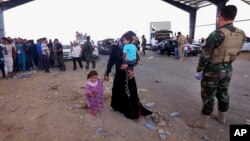Militants from the Islamic State of Iraq and the Levant overran Iraq's second largest city, Mosul, Tuesday as part of their push to create a region ruled by Islamic law in parts of Iraq and Syria. Analysts say this attack, which follows similar gains in Ramadi and Fallujah, is part of a wider objective of showing the Iraqi government's weaknesses as a way to garner support for their campaign.
Witnesses say hundreds of fighters in military dress arrived in Mosul's southern section and made their way to the west before capturing the heart of the city while taking control of military bases, government facilities and television stations.
Amir Goran, a Mosul-based reporter for VOA's Kurdish service, says in the beginning, everyone was expecting a strong response from Iraqi government forces backed by their helicopter gunships. He says no one expected the ISIL militants to take control of the entire city.
A doctor based in Mosul described his sense of shock in realizing that the city been left defenseless.
"There is no fighting. They run away. Everybody, the army, they run away. It is unbelievable. All the the army on the left side of the city, leave the city without any fighting," he said.
Ken Pollack, a Middle East expert with the Brookings Institution, says the lack of response by Iraqi forces is the result of the politicization of the Iraqi military and a reduction in the training of its forces.
"What we saw from the Iraqi security forces in Mosul is indicative of a larger pattern that we've seen with the Iraqi military since the departure of American forces since 2011," said Pollack. "The Iraqis were never terrific to begin with, but they achieved a certain level of competency under the Americans."
Pollack says other factors, including the replacement of key generals, has led to a wide-scale breakdown in morale, which is evident in the army's fighting against ISIL militants in Fallujah, Anbar province and Mosul.
He says the ISIL has thrived during that breakdown, also tapping into the disillusionment of many of Iraq's minority Sunni Arabs who feel they are being marginalized and have no alternative but to fight the Shia-led government of Prime Minister Nouri al-Maliki.
"What we have seen is that ISIL has grown enormously in strength over the past two or three years as a result of the disillusionment of the Arab Sunni community with the Shia-dominated government of Nouri al-Maliki. There is an increasing sense among Sunnis that Nouri al-Maliki is nothing but a Shia chauvinist who seeks to oppress them exactly as they oppressed the Shia under Saddam Hussein's regime," he said.
The takeover of Mosul is the latest step in the ISIL's campaign to create an Islamist state in western Iraq and eastern Syria. In broadcasts to the city's residents, the militants said they want to preserve the safety of civilians and promised not to inflict damage to their properties or government buildings.
Witnesses say hundreds of fighters in military dress arrived in Mosul's southern section and made their way to the west before capturing the heart of the city while taking control of military bases, government facilities and television stations.
Amir Goran, a Mosul-based reporter for VOA's Kurdish service, says in the beginning, everyone was expecting a strong response from Iraqi government forces backed by their helicopter gunships. He says no one expected the ISIL militants to take control of the entire city.
A doctor based in Mosul described his sense of shock in realizing that the city been left defenseless.
"There is no fighting. They run away. Everybody, the army, they run away. It is unbelievable. All the the army on the left side of the city, leave the city without any fighting," he said.
Ken Pollack, a Middle East expert with the Brookings Institution, says the lack of response by Iraqi forces is the result of the politicization of the Iraqi military and a reduction in the training of its forces.
"What we saw from the Iraqi security forces in Mosul is indicative of a larger pattern that we've seen with the Iraqi military since the departure of American forces since 2011," said Pollack. "The Iraqis were never terrific to begin with, but they achieved a certain level of competency under the Americans."
Pollack says other factors, including the replacement of key generals, has led to a wide-scale breakdown in morale, which is evident in the army's fighting against ISIL militants in Fallujah, Anbar province and Mosul.
He says the ISIL has thrived during that breakdown, also tapping into the disillusionment of many of Iraq's minority Sunni Arabs who feel they are being marginalized and have no alternative but to fight the Shia-led government of Prime Minister Nouri al-Maliki.
"What we have seen is that ISIL has grown enormously in strength over the past two or three years as a result of the disillusionment of the Arab Sunni community with the Shia-dominated government of Nouri al-Maliki. There is an increasing sense among Sunnis that Nouri al-Maliki is nothing but a Shia chauvinist who seeks to oppress them exactly as they oppressed the Shia under Saddam Hussein's regime," he said.
The takeover of Mosul is the latest step in the ISIL's campaign to create an Islamist state in western Iraq and eastern Syria. In broadcasts to the city's residents, the militants said they want to preserve the safety of civilians and promised not to inflict damage to their properties or government buildings.





